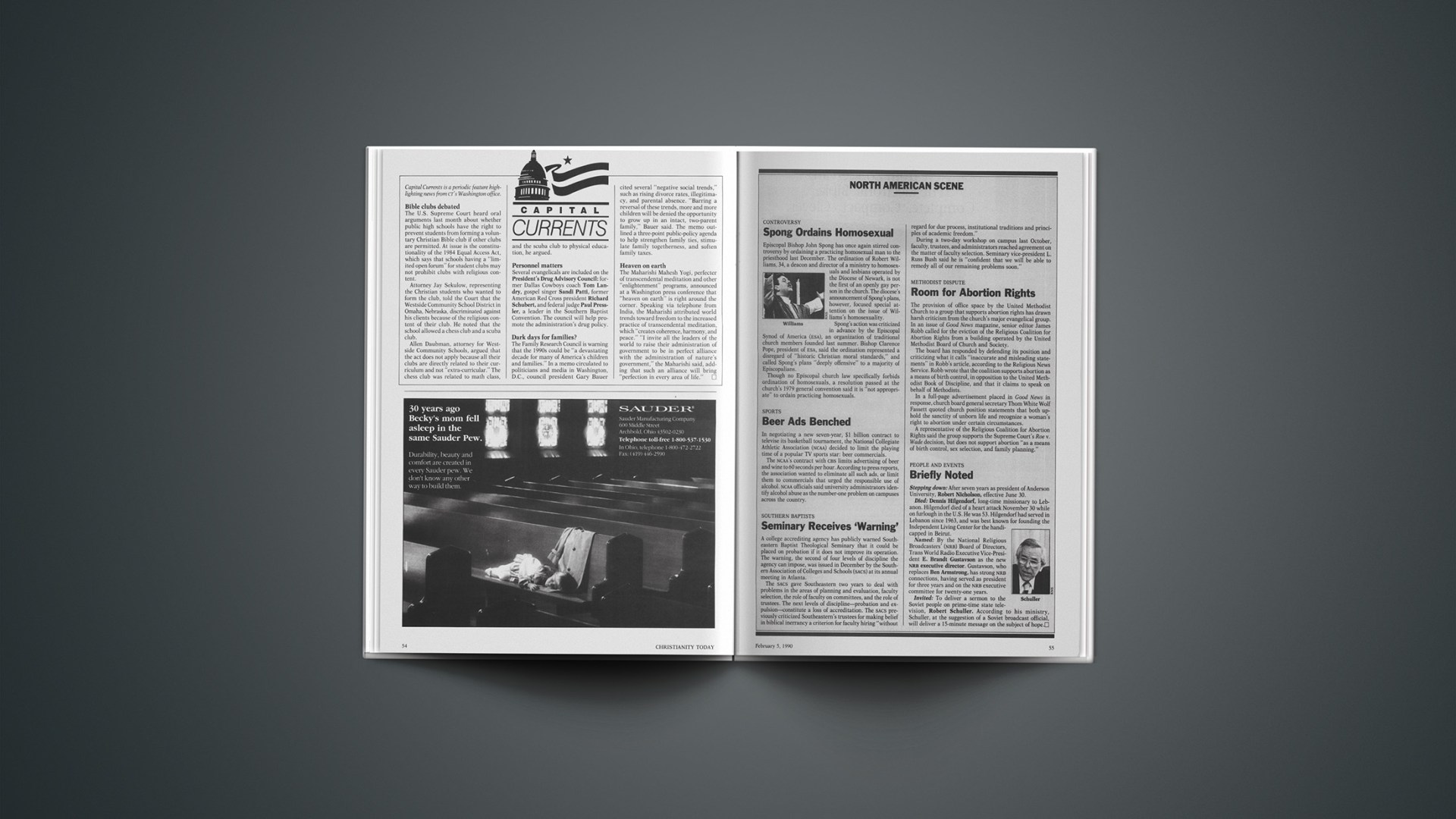CONTROVERSY
Spong Ordains Homosexual
Episcopal Bishop John Spong has once again stirred controversy by ordaining a practicing homosexual man to the priesthood last December. The ordination of Robert Williams, 34, a deacon and director of a ministry to homosexuals and lesbians operated by the Diocese of Newark, is not the first of an openly gay person in the church. The diocese’s announcement of Spong’s plans, however, focused special attention on the issue of Williams’s homosexuality.
Spong’s action was criticized in advance by the Episcopal Synod of America (ESA), an organization of traditional church members founded last summer. Bishop Clarence Pope, president of ESA, said the ordination represented a disregard of “historic Christian moral standards,” and called Spong’s plans “deeply offensive” to a majority of Episcopalians.
Though no Episcopal church law specifically forbids ordination of homosexuals, a resolution passed at the church’s 1979 general convention said it is “not appropriate” to ordain practicing homosexuals.
SPORTS
Beer Ads Benched
In negotiating a new seven-year, $1 billion contract to televise its basketball tournament, the National Collegiate Athletic Association (NCAA) decided to limit the playing time of a popular TV sports star: beer commercials.
The NCAA’s contract with CBS limits advertising of beer and wine to 60 seconds per hour. According to press reports, the association wanted to eliminate all such ads, or limit them to commercials that urged the responsible use of alcohol. NCAA officials said university administrators identify alcohol abuse as the number-one problem on campuses across the country.
SOUTHERN BAPTISTS
Seminary Receives ‘Warning’
A college accrediting agency has publicly warned Southeastern Baptist Theological Seminary that it could be placed on probation if it does not improve its operation. The warning, the second of four levels of discipline the agency can impose, was issued in December by the Southern Association of Colleges and Schools (SACS) at its annual meeting in Atlanta.
The SACS gave Southeastern two years to deal with problems in the areas of planning and evaluation, faculty selection, the role of faculty on committees, and the role of trustees. The next levels of discipline—probation and expulsion—constitute a loss of accreditation. The SACS previously criticized Southeastern’s trustees for making belief in biblical inerrancy a criterion for faculty hiring “without regard for due process, institutional traditions and principles of academic freedom.”
During a two-day workshop on campus last October, faculty, trustees, and administrators reached agreement on the matter of faculty selection. Seminary vice-president L. Russ Bush said he is “confident that we will be able to remedy all of our remaining problems soon.”
METHODIST DISPUTE
Room For Abortion Rights
The provision of office space by the United Methodist Church to a group that supports abortion rights has drawn harsh criticism from the church’s major evangelical group. In an issue of Good News magazine, senior editor James Robb called for the eviction of the Religious Coalition for Abortion Rights from a building operated by the United Methodist Board of Church and Society.
The board has responded by defending its position and criticizing what it calls “inaccurate and misleading statements” in Robb’s article, according to the Religious News Service. Robb wrote that the coalition supports abortion as a means of birth control, in opposition to the United Methodist Book of Discipline, and that it claims to speak on behalf of Methodists.
In a full-page advertisement placed in Good News in response, church board general secretary Thom White Wolf Fassett quoted church position statements that both uphold the sanctity of unborn life and recognize a woman’s right to abortion under certain circumstances.
A representative of the Religious Coalition for Abortion Rights said the group supports the Supreme Court’s Roe v. Wade decision, but does not support abortion “as a means of birth control, sex selection, and family planning.”
PEOPLE AND EVENTS
Briefly Noted
Stepping down: After seven years as president of Anderson University, Robert Nicholson, effective June 30.
Died: Dennis Hilgendorf, long-time missionary to Lebanon. Hilgendorf died of a heart attack November 30 while on furlough in the U.S. He was 53. Hilgendorf had served in Lebanon since 1963, and was best known for founding the Independent Living Center for the handicapped in Beirut.
Named: By the National Religious Broadcasters’ (NRB) Board of Directors, Trans World Radio Executive Vice-President E. Brandt Gustavson as the new NRB executive director. Gustavson, who replaces Ben Armstrong, has strong NRB connections, having served as president for three years and on the NRB executive committee for twenty-one years.
Invited: To deliver a sermon to the Soviet people on prime-time state television, Robert Schuller. According to his ministry, Schuller, at the suggestion of a Soviet broadcast official, will deliver a 15-minute message on the subject of hope.










